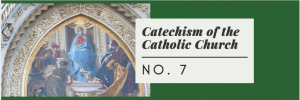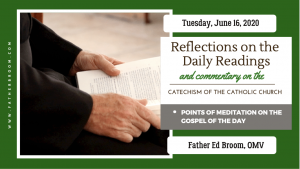
June 16 2020
Tuesday of the Eleventh Week in Ordinary Time
Reading 1 1KGS 21:17-29
After the death of Naboth the LORD said to Elijah the Tishbite:
“Start down to meet Ahab, king of Israel,
who rules in Samaria.
He will be in the vineyard of Naboth,
of which he has come to take possession.
This is what you shall tell him,
‘The LORD says: After murdering, do you also take possession?
For this, the LORD says:
In the place where the dogs licked up the blood of Naboth,
the dogs shall lick up your blood, too.’”
Ahab said to Elijah, “Have you found me out, my enemy?”
“Yes,” he answered.
“Because you have given yourself up to doing evil in the LORD’s sight,
I am bringing evil upon you: I will destroy you
and will cut off every male in Ahab’s line,
whether slave or freeman, in Israel.
I will make your house like that of Jeroboam, son of Nebat,
and like that of Baasha, son of Ahijah,
because of how you have provoked me by leading Israel into sin.”
(Against Jezebel, too, the LORD declared,
“The dogs shall devour Jezebel in the district of Jezreel.”)
“When one of Ahab’s line dies in the city,
dogs will devour him;
when one of them dies in the field,
the birds of the sky will devour him.”
Indeed, no one gave himself up to the doing of evil
in the sight of the LORD as did Ahab,
urged on by his wife Jezebel.
He became completely abominable by following idols,
just as the Amorites had done,
whom the LORD drove out before the children of Israel.
When Ahab heard these words, he tore his garments
and put on sackcloth over his bare flesh.
He fasted, slept in the sackcloth, and went about subdued.
Then the LORD said to Elijah the Tishbite,
“Have you seen that Ahab has humbled himself before me?
Since he has humbled himself before me,
I will not bring the evil in his time.
I will bring the evil upon his house during the reign of his son.”
Responsorial Psalm 51:3-4, 5-6AB, 11 AND 16
R. (see 3a) Be merciful, O Lord, for we have sinned.
Have mercy on me, O God, in your goodness;
in the greatness of your compassion wipe out my offense.
Thoroughly wash me from my guilt
and of my sin cleanse me.
R. Be merciful, O Lord, for we have sinned.
For I acknowledge my offense,
and my sin is before me always:
“Against you only have I sinned,
and done what is evil in your sight.”
R. Be merciful, O Lord, for we have sinned.
Turn away your face from my sins,
and blot out all my guilt.
Free me from blood guilt, O God, my saving God;
then my tongue shall revel in your justice.
R. Be merciful, O Lord, for we have sinned.
Alleluia JN 13:34
R. Alleluia, alleluia.
I give you a new commandment;
love one another as I have loved you.
R. Alleluia, alleluia.
Gospel MT5:43-48
Jesus said to his disciples:
“You have heard that it was said,
You shall love your neighbor and hate your enemy.
But I say to you, love your enemies
and pray for those who persecute you,
that you may be children of your heavenly Father,
for he makes his sun rise on the bad and the good,
and causes rain to fall on the just and the unjust.
For if you love those who love you, what recompense will you have?
Do not the tax collectors do the same?
And if you greet your brothers only,
what is unusual about that?
Do not the pagans do the same?
So be perfect, just as your heavenly Father is perfect.”
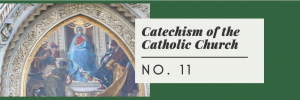
III. The Aim and Intended Readership of the Catechism
11 This catechism aims at presenting an organic synthesis of the essential and fundamental contents of Catholic doctrine, as regards both faith and morals, in the light of the Second Vatican Council and the whole of the Church’s Tradition. Its principal sources are the Sacred Scriptures, the Fathers of the Church, the liturgy, and the Church’s Magisterium. It is intended to serve “as a point of reference for the catechisms or compendia that are composed in the various countries”.

“For greater things you were born.” (Ven. Mother Luisita)
TUESDAY, JUNE 16TH Mt. 5:43-48 “I say to you, love your enemies and pray for those who persecute you, that you may be children of your heavenly Father!”
Loving God, Loving Self, and Loving Our Neighbor – Even Our Enemies!
Excerpts from talk by Sister Mary Clare, O.C.D.
There is no authentic Catholic spirituality that is not social. So if you ever come across a spirituality that says you can reach union with God, which is our ultimate goal, in isolation, you cannot do that, and that is not authentically Catholic.
We are meant to live as the Body of Christ in communion with one another. It’s really important to think about our spirituality and how it integrates into what we do every day. We are human beings made in the image and likeness of God and we have to know how we integrate who we are, our being, into what we do every day.
The three reflections that I want to look at today are: encounter with Christ, encounter with our neighbor, and discernment in practice.
Encounter with Christ…
- In today’s society, we really have a crisis of meaning. What is life all about? And this leads to a sense of alienation. There’s a sense of loss, a sense of mourning in our society because of this.
- We have a disposable culture, right? We think about life in prospect and for us it’s cheap and disposable. It’s an inconvenience. Just get rid of it (legalized abortion). We think about life in fact and it’s expensive and disposable. We can’t afford you, so we’ll get rid of you (legalized euthanasia). That’s the kind of society mentality that we’re thinking in.
- And in order to solve it, we’re grasping after truths. We’re trying to find out, “What’s the truth?” When we really need to be seeking the Truth with a capital “T”, right? That’s going to be the answer to our problems.
- We can only do that, we can only change, if we begin with ourselves. Be souls of prayer or else you will have nothing to give. We need to encounter Christ in our daily life. That means taking time out. That means spending time with Our Lord. I’ve got to encounter the Person of Christ.
- In order to treat others with dignity, I must first know mine. I must know what it means to be a child of God, right? I must know what it means to be made in His image and likeness. I must experience that I have been called into being by name for a purpose. And once I’ve experienced that, then I can experience that you have been called into being by name for a purpose and reverence it.
- If you knew the gift of God and who it is that is saying to you, “Give me to drink,” you would have asked Him, and He would have given you living water. Christ will give to us, but we must go to Him.
- He wants to give to us in abundance. I’m not perfect; I’m broken; I need to be redeemed. But I am not disposable. I’m not dispensable. I have a mission that no one else can fill. I have to believe that about myself, right? I have to know His grace is abundant.
Encounter with our neighbor…
- As I said before, all Catholic spirituality is social. We’re meant to live in community. We’re created to live in community. And that’s true because we’re made in the image of the Trinity who is an eternal community, right? An eternal communion of three Persons. So we can’t ever let that go.
- The primary way we experience community is obviously through marriage and the family; but then that extends out to the broader community of the Body of Christ, the Church; and then even beyond that into the broader community of the human family, of everyone created as a child of God.
- Going back to our encounter with Christ and how this fits into neighbor, when I’m looking at Christ, I’m looking into the face of Christ. John Paul would say that a lot, right? Contemplating the face of Christ, He mirrors back to me who I am. He mirrors back to me my value and my dignity.
- We do the same with each other. When you look into my eyes, I mirror back to you who you are, the value of who you are as a person. When you look at me, the questions that come unconsciously to your mind are, “Do you see me? Do you care?” And the immediate next questions that come to mind are, “Does anybody care?” And “Does God care?” So can you see how important our interaction with our neighbor is? Because if they’re not experiencing through us that human love, how can they experience the love of God? We must do that for one another.
- God puts in our paths every day the persons He desires for us to encounter. We don’t have to go looking. What we need to do is to pray for the grace for our eyes to see as Christ sees. To see my neighbor – that is, to see the person in front of me, as Christ sees them. To be able to see their need and then meet it, right?
- So realizing what our limitations are, what am I called to do? What’s best for the person in front of me at the moment? I may not be able to help them, but I can know somebody to refer them to. Always in that mutual self-gift. This is what we can do on a daily basis in our own lives; this is what we’re called to do, one person at a time.
- When we take it into the broader social picture, we realize that this really is a form of evangelization for us, and we cannot evangelize a culture that we don’t love. There’s going to be opinions that we disagree with. There’s going to be views that are objectively wrong and we can’t condone that. We must work to correct those, but we have to do it in a spirit of love. Love others back into Truth.
Discernment in Practice…
- Ignatius tells us, first look at your state of life. Am I married? My first obligation is to my spouse and to my family, right? We have to have that work-life balance.
- Because my second vocation is what I do and how I bring Christ into the world. We have to make our choices based on that. Anything else beyond that is extra.
- The demand of love in front of me! Who’s the person that God has put into my path at this moment and how must I love them? In one of his homilies, Bishop Vasha, talking about Lazarus at the door, said each of us must ask, “Who’s at my doorstep?”
- Finally, what’s the need of my local Church? Am I helping to fulfill that need or am I off doing my own thing. That’s something to look at.
“May God Our Lord be pleased and continue to bless our poor work, so insignificant in comparison to what He deserves, but all that He’s asking of us. That’s all He wants of us. And in doing that we will come to union with Him and we will bring others to Him one person at a time. Be what you are supposed to be – a saint! For greater things you were born.” (Ven. Mother Luisita)
EDITOR’S NOTE: Unplanned is an excellent movie portraying how to correct others in a spirit of love – loving others back into Truth. Unplanned is the true story of Abbey Johnson who worked for Planned Parenthood until a she witnessed an abortion procedure that changed her views and her life in that one moment.
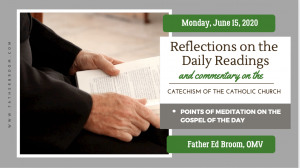
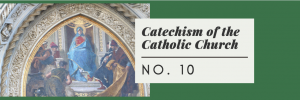

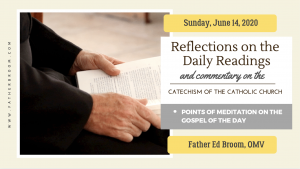


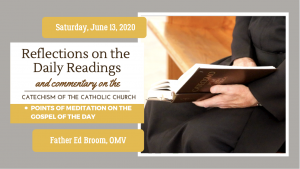
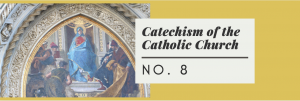 Catechism of the Catholic Church
Catechism of the Catholic Church

